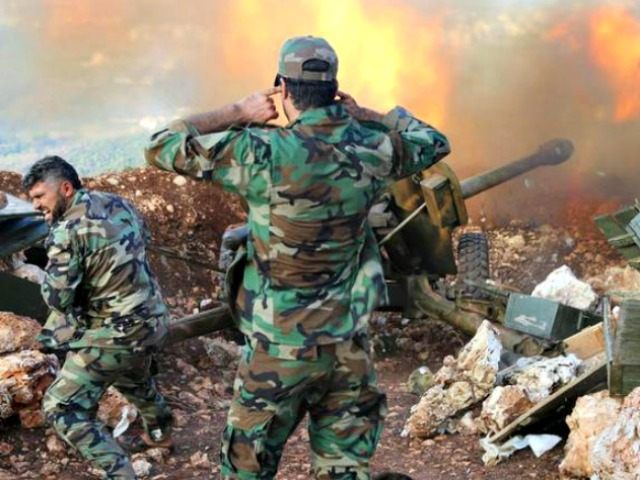While the government of Iran is officially denying it has deployed ground troops in Syria, Iranian media is reporting that more than one dozen Islamic Revolution Guard Corps officers have died there in the past three years.
Among the most recent four high-ranking casualties was Brigadier General Hossein Hamedani, reportedly killed in fighting near Aleppo.
“According to Iranian media, 18 high-ranking IRGC officers have been killed in Syria in the past three years,” writes the BBC. “But the killing of four in just one week – particularly one just before a major offensive – implies that Iran may be more involved in the war than it has previously acknowledged.”
Perhaps in an effort to balance the damage to morale from the loss of those ranking IRGC officers, both Iranian and Syrian media outlets have published photos of Quds Force commander Major General Qassem Soleimani in Syria. His presence in the country has been well-known, but rarely advertised. He seems to be spending more time in Syria and less in Iraq these days, signaling a change in focus for Iran’s strategy against the Islamic State.
The Washington Post describes Soleimani as commanding Shiite forces from three different countries to support the Syrian military: Iraqi Shiite militamen, Lebanese Hezbollah fighters, and elite Iranian ground troops.
Some of those Iraqi Shiite forces are decidedly Iranian in spirit. “It makes no difference whether we’re in Iraq or Syria, we consider it the same front line because we are fighting the same enemy. We are all the followers of Khamenei and will go and fight to defend the holy sites and Shiites everywhere,” said one Iraqi militia spokesman quoted by the Washington Post. Ayatollah Ali Khamenei is the “Supreme Leader” of Iran.
Another Iraqi Shiite militia man described the Syrian army as playing only a “minor role” in Soleimani’s war plans. This man’s group, incidentally, is Kitaeb Hezbollah, designated a terrorist organization by the United States government, and proud to boast its “special forces are well-trained from fighting against the Americans before.”
In another contrast with the official line denying Iranian combat forces in Syria, the BBC notes that Iran’s official news agencies have reported several hundred Iranian and Afghan “volunteers” killed in action against the enemies of the Assad regime. In a similar vein, Iran tries to preserve its official fictions by describing the high-ranking officers killed in Syria as “retired” commanders who were “volunteering” to give the Syrians a hand.
Iran does occasionally tout its success at organizing Syrian paramilitary or militia forces, currently said to include over 100,000 fighters, but such claims stretch back over the years when ISIS was thrashing the Syrian military and gobbling up territory at an alarming rate. The BBC’s analysis suggests that a combination of Syrian dictator Bashar Assad’s desperation and the increased Iranian resources made possible by President Obama’s nuclear deal have inspired Tehran to take a more active role on the battlefield. The availability of Russian air cover could also factor into Iran’s strategic decisions.
Deputy Foreign Minister Hossein Amir-Abdollahian simultaneously boasted of Iran’s coordination with the Assad regime, and denied Iran was deploying ground forces in Syria, when talking with Tehran-based PressTV on Wednesday.
“We enjoy coordination with Syria and Russia in the fight against Daesh,” he boasted, using another name for ISIS. “Tehran-Moscow relations are robust and strategic, and the Islamic Republic of Iran seeks similar ties with European countries as well as with its neighbors.”
However, Amir-Abdollahian insisted Iran is sending only military advisers to Syria, not ground troops, a line PressTV also sources to Syria’s Information Minister. PressTV takes care to repeat the Syrian, Iranian, and Russian contention that the struggle against Assad has been a “foreign-backed militancy,” not a rebellion of Syrian citizens against the regime.

COMMENTS
Please let us know if you're having issues with commenting.